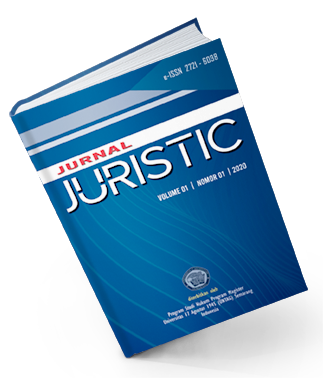Otoritas Notaris/PPAT Dalam Menerima Titipan Pembayaran Pajak Bea Perolehan Hak Atas Tanah Dan Bangunan
Sari
Teks Lengkap:
PDFReferensi
Artioko, Fiqih Rizki. “Pengadopsian Partisipasi Masyarakat Yang Bermakna (Meaningful Participation) Dalam Undang-Undang Nomor 13 Tahun 2022Tentang Perubahan Kedua Undang-Undang Nomor 12 Tahun 2011 Tentang Pembentukan Peraturan Perundang-Undangan.†Al-Qisth Law Review 6, no. 1 (2022): 52. https://doi.org/ 10.24853/al-qisth.6.1.52-83.
Hafidati, Putri. “Kebijakan Publik Terhadap Pendidikan Di Indonesia Pada Masa Pemerintahan Orde Reformasi.†Jurnal Magister Ilmu Hukum 5, no. 1 (2021): 40. https://doi.org/10.36722/jmih.v5i1.770.
Muhammad Azhar. “Relevansi Asas-Asas Umum Pemerintahan Yang Baik Dalam.†Notarius 8, no. 2 (2015): 274–87. http://download.garuda.kemdikbud.go.id/article. php?article=1402036&val=1276&title=RELEVANSI ASAS-ASAS UMUM PEMERINTAHAN YANG BAIK DALAM SISTEM PENYELENGGARAAN ADMINISTRASI NEGARA.
Natalia, Angga. “Paradigma Good Governance Dalam Administrasi Publik Memfasilitasi Pencapaian Tujuan Pembangunan Berkelanjutan (Tbp).†Jurnal Tapis: Jurnal Teropong Aspirasi Politik Islam 18, no. 1 (2022): 15–26. https://doi.org/10.24042/ tps.v18i1.12199.
Nugraha, Safri. “Laporan Akhir Tim Kompendium Bidang Hukum Pemerintah Yang Baik.†Bphn.Go.Id, 2007, 1–109. https://www.bphn.go.id/data/documents/pemerintahan_yang_baik.pdf.
Pamungkas, Bambang Adhi. “Pelaksanaan Otonomi Desa Pasca Undang-Undang Implementation of the Post-Regulation Autonomy of Village Number 6 of 2014 Concerning Village.†Jurnal USM Law Review Vol 2 No 2 Tahun 2019 2, no. 2 (2016): 210–29.
Pinangkaan, Nelly. “Good Governance Dan Hak Asasi Manusia Dalam Keterbukaan Informasi.†Lex et Societatis IV, no. 6 (2016): 112–22. http://arxiv.org/abs/ 1011.1669%0Ahttp://dx.doi.org/10.1088/1751-8113/44/8/085201.
Purba, Fransiska NG, and M. Mun’am Syaiful Huda. “Upaya Penyelenggaraan Pemerintahan Yang Baik (Good Governance) Dalam Pencegahan Korupsi, Kolusi, Dan Nepotisme).†Dewantara : Jurnal Pendidikan Sosial Humaniora 1, no. 3 (2022): 138–49. https://jurnaluniv45sby.ac.id/index.php/Dewantara/article/download/466/447.
Rahmanto, Tony Yuri. “Calon Tunggal Dalam Perspektif Hak Memilih Dan Dipilih Di Provinsi Banten.†Jurnal HAM 9, no. 2 (2018): 103. https://doi.org/10.30641/ ham.2018.9.103-120.
Ramadhani Puji Astutik, Yusuf, Sugiaryo. “Urnal Lobal Itizen.†Jurnal Global Citizen Jurnalilmiah 9, no. 2 (2020): 51–62.
Ridho Mubarak, Wessy Trisna. “Determination Of State Financial Loss Due To Abuse Of The Authority Of Government Officers (Penentuan Kerugian Keuangan Negara Akibat Penyalahgunaan Kewenangan Pejabat Pemerintah).†Jurnal Ilmiah Penegakan Hukum 8, no. 2 (2021): 160–73.
Saktiananda, R A, I Fautanu, and ... “Penguatan Prinsip-Prinsip Good Governance Dalam Rangka Meningkatkan Kinerja ASN Kemendagri Republik Indonesia.†Perfecto: Jurnal Ilmu 01, no. September (2023): 145–52. https://jurnal.ideaspublishing. co.id/index.php/jih/article/view/1487%0Ahttps://jurnal.ideaspublishing.co.id/index.php/jih/article/download/1487/586.
Subiyanto, Achmad Edi. “Mendesain Kewenangan Kekuasaan Kehakiman Setelah Perubahan UUD 1945.†Jurnal Konstitusi 9, no. 4 (2016): 661. https://doi.org/ 10.31078/jk944.
Sugiyatmo, Agus, and Ermania Widjajanti. “Memerangi Pencucian Uang Pejabat Korup Dengan Melakukan Perampasan Aset Dan Pembuktian Terbalik Dalam Pembaharuan Hukum.†Journal of Law, Administration, and Social Science 4, no. 6 (2024): 1045–52. https://doi.org/10.54957/jolas.v4i6.953.
DOI: http://dx.doi.org/10.56444/jrs.v6i01.6071
Refbacks
- Saat ini tidak ada refbacks.
Publishing Office :
Terindeks :






View Jurnal JURISTIC Stats





